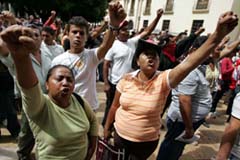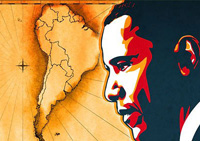
The Road to Zelaya’s Return: Money, Guns and Social Movements in Honduras
Nearly three months after being overthrown by a violent military coup, Honduran president Manuel Zelaya has returned to

Nearly three months after being overthrown by a violent military coup, Honduran president Manuel Zelaya has returned to

Source: Rebel Reports
In its ever-evolving re-branding campaign, Blackwater has created a new alter-ego for part of the company’s business. Meet the “Personal Security Awareness” program, which appears to be an off-shoot of Erik Prince’s Greystone, Ltd., a classic mercenary operation registered offshore in Barbados. On its website, which was registered on February 20, 2009 and went live recently, the “program” is described as “a multi-phase course which is designed to assist Non-Government Organizations, Faith Based Organizations and Commercial Businesses by providing individual personal awareness and driver training for their personnel when deployed to unfamiliar environments.” It adds: “Greystone recognizes the importance of “preparation by doing” and looks forward to you joining us for this exciting training!”

Source: Women’s eNews
Rioters attacked and stripped about 20 Ugandan women who were wearing trousers last week during deadly riots in Kampala. The humiliations were part of a major confrontation between a traditional kingdom and President Yoweri Museveni’s government.
KAMPALA, Uganda (WOMENSENEWS)–Male rioters in a suburb here on September 11 attacked about 20 women wearing trousers.
The men, in Rubaga, a Kampala suburb, began detaining women during their protests, police spokeswoman Judith Nabakooba said at a press conference that took place that same day.
.jpg)
As troops and planes headed toward Afghanistan in October 2001, few people questioned the reasons for military engagement. But the causes of war are rarely simple and, as time has passed, other powerful motives have come into focus. As it turns out, the US war plan was in the works months before the 9/11 attacks.

It was a winter day in the Argentine city of Bariloche when 12 South American presidents gathered there on August 28. It was so cold that Hugo Chavez wore a red scarf and Evo Morales put on a sweater. The presidents arrived at the Union of South American Nations (UNASUR) meeting to discuss a US plan to establish seven new military bases in Colombia. Though officials in Colombia and the US say the bases would be aimed at combating terrorism and the drug trade, US military and air force documents point to other objectives.

Source: The New Internationalist
It isn’t really a factory. The ‘finishing unit’, where garments are stacked in boxes ready for shipment to Britain and America, is in the lower story of an extensive private house enclosed by a high stone wall in the Mirpur district of Dhaka. The stairs are piled with cardboard containers, so it is almost impossible to reach the upstairs apartment.
Here, the last touches are put to ready-made apparel for export. The workshop is a plain, windowless room, about 12 or 15 metres square. There are 45 workers, a majority girls, about half of them under 14. A boy is at a machine sewing buttons. Girls stand at a table, trimming loose threads and checking that the buttons are firm and the zip-fasteners work smoothly. Others stand at old-fashioned domestic ironing boards, from which steam rises in little mushroom-clouds. At a trestle, each garment is carefully folded and then passed to a line of young women who seal it in transparent polythene. Other girls stack them in cardboard cartons. They handle each piece as though it were a tray of eggs. From here, all the material will go to shipping containers for delivery to GAP and Primark in Britain, to Wal-Mart and K-Mart in North America.
Copyright Toward Freedom 2019